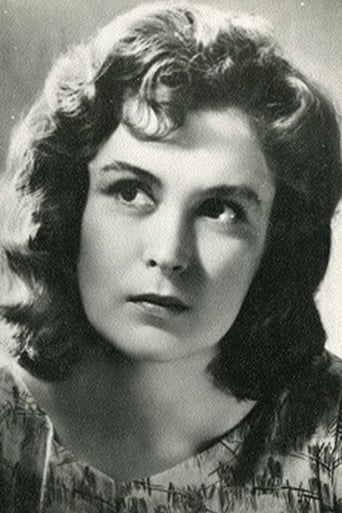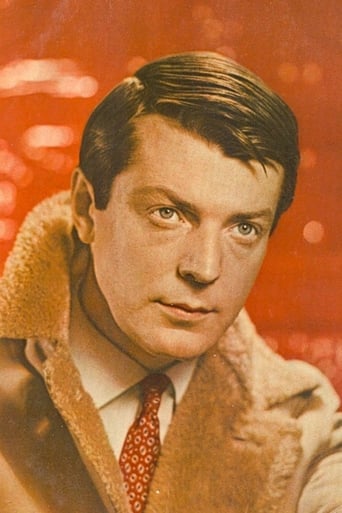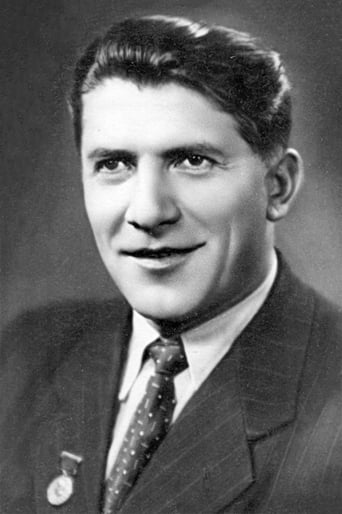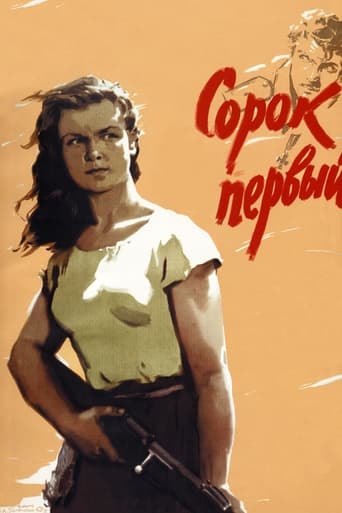
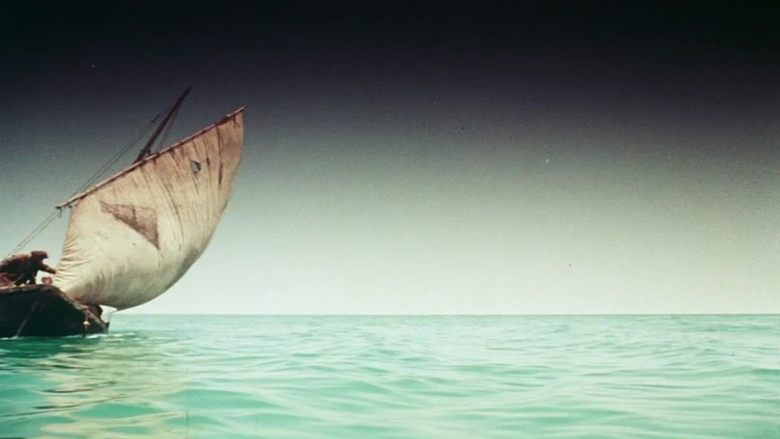
The Forty-First (1956)
An unexpected romance occurs for a female Red Army sniper and a White Army officer.
Watch Trailer
Cast
Reviews
Such a frustrating disappointment
Just perfect...
It is a performances centric movie
It's the kind of movie you'll want to see a second time with someone who hasn't seen it yet, to remember what it was like to watch it for the first time.
The feature debut of Soviet Union director Grigoriy Chukhray (who would subsequently acquire international fame for BALLAD OF A SOLDIER in 1959, his second feature), THE FORTY-FIRST is a potentially engrossing romance happens in the two warring parties during the Russian civil war, a Red Army sniper Maria (Izvitskaya) and a White Army officer Lieutenant Vadim (Strizhenov).The storyline is straightforward and linear, based on the eponymous novel by Boris Lavrenyev. Maria is among a defeated Red Army unit, leaded by Commissar Yevsyukov (Kryuchkov), she is a marks-woman, who has already claimed forty lives of her enemies. On their route to retreat in Karakum Desert, the group captures Vadim, aka. the titular forty-first which miraculously survives Maria's bullet, who is carrying a secret oral message to a White Army general, so they keep him as a captive and the Commissar puts him under Maria's guard. When they finally arrives at the Aral Sea, Maria and two other soldiers are entrusted to take Vadim on a boat to their headquarter in Kazaly, but stormy weather causes the boat stranded on a nameless island, and only Maria and Vadim have survived. The seclusion becomes a hotbed for their mutual affection which has engendered throughout their journey to bloom, Maria's nurturing nature, her passion for writing verses and aspiring to acquiring further education and Vadim's erudite knowledge, his "dangerous" blue eyes, bring them closer, not as sworn enemies, but two tender souls, a scintillating paragraph, where they finally embrace and smooch, after Vadim tells her the story of Robinson Crusoe and jokes that she is his "Man Friday". They share the most joyous time on the island, in spite of their ideological disparity of war and life, it is something they must adjust and reconcile for the sake of their love, and at one time, it seems working, they are frank to each other and decide to face the uncertain future together, a happy-ending beckons when a boat is approaching to rescue them, but the climax arrives so abrupt and emotionally manipulative in the coda, when the true identity of the boat is revealed, Maria's almost spontaneous reflex brings a poignant doom to the pair of star-crossed lovers, echoes the portentous title.From the gaping geographical shifting, starts in the desert, to the choppy Aral Sea, terminates on the isolated island, perpetually under an indigo shade, Chukhray emerges as a staunch craftsman in grappling with the diversity of locations, also revels in bestowing an ethnographic touch with its disinterested depiction of Auls people. More bracingly, considering it time, the film is pluckily against the grain of the propaganda exploitation in the Soviet industry at then, humanises the image of a White Army officer, and inspires audience to empathise the genuine affection regardless of their political beliefs, even though the ending could be read as a heroic feat of the loyalty to the Red Army, more resoundingly yet inconspicuously, one cannot help but becoming cognizant of the detrimental power which a radical code of belief can afflict on its subject, to brainwash them, to call on unconditional sacrifice with no bottom-line. Rather than arguing whether the Red or the White serves as the object of Chukhray's admonition, it seems to me, the real deal is the war itself, a diabolical act disguised as a manifestation of patriotism with disastrous outcome, but in essence, only capitalised on by those few warmongers for some elephant-in-the- room self-serving interests, yet, the same thing continues to repeat itself, again and again, no end is in sight. As for the film itself, my admiration is ample and well-grounded.
The Forty First is pretty much a Soviet Romeo and Juliet. Romance aside, the film offers some praiseworthy elements cinematographically. While detail-oriented aspects of Soviet montage are absent, some long shots of Red soldiers stumbling through desert dunes have a desolate beauty, and scenes in a small Kazakh village are wonderfully authentic. However, bulk of the story takes place in aesthetically blank isolation, where romance and ideology can clash beyond of the confines of armed conflict. Like Chapaev, The Forty First introduces the Whites through a prisoner of war. Unlike Chapaev though, and in a step away from Stalinist film standards, the captured counterrevolutionary lieutenant is unrepentant, and yet still a sympathetic character. The Red and White forces as a whole are depicted in the typical fashion; the Whites as lofty bourgeoisie officers performing acts of unjustified brutality, the Reds as under-supplied and struggling in the face of insurmountable odds. However, the prisoner, Lieutenant Otrok, is merely a wealthy intellectual. Otrok pines for the loss of his pedagogic comfort, not the fall of the monarchical system, and in this sense he is a relatable character. He is apologetic for the conditions that caused the war, and views his captors with good natured derision rather than hatred. We are treated to a well crafted, if utterly predictable, romantic progression as the dogmatic sniper Maryutka, assigned to guard the prisoner, is slowly enchanted by Otrok's charm and intelligence. The film is not a story of bourgeois contamination, though, as Maryutka remains disgusted by the Lieutenant's detachment from the ideological issues of the revolution. The film ultimately determines that regardless of motivation and culpability, the proletariat and bourgeoisie are incompatible. Admittedly, the romantic progression at the center of The Forty First is unremarkable from a modern perspective. However, the film deserves praise for addressing the generally rigid revolutionary genre in a novel and more liberal manner.
Much can be said about the range of emotions found in today's movies. They've certainly become better at promoting a cool atmosphere, adrenaline rushes, making plots that are cleverly built up to a climax, and fitting in as many square centimetres of skin as possible into the film. Some emotions are, however, totally, and I mean totally, disregarded. Intense melancholy, an intense sense of longing and sensations of intense pity for the characters are now nowhere to be found. This movie has all of that in spades, making it radically different from today's European and American movies. It is more "theatrical" than today's more "realistic" films, but for God's sake, don't let that put you off. An incessantly beautiful soundtrack sweeps through the entire film, and the pictures are stunningly beautiful, though in a Russian way that can simply be labelled "different". This film was an eye-opener to the fact that I've seen so many movies that ultimately have left me nearly indifferent to the fate of the characters, and to some loose theory that melancholy and pity are closely related. Everyone should hunt this movie down. The ending will haunt you forever. Anything you watch afterwards will seem like ridiculous attempts to give you cheap thrills.
One of the very best films of Soviet cinema,has little propaganda and a lot of sentiment, in a story that takes place during the soviet revolution. Boy meets girl, in the worst possible time, although, it is the war that unites them. They belong in different sides, but the new era makes their love possible. But duty comes before love in the Soviet cinema, so the end is sad but beautiful, and actually you can't imagine the film with a different ending. I don't want to forget that the cinematography is perfect and the artistic direction of the best kind. One of my favorites!
